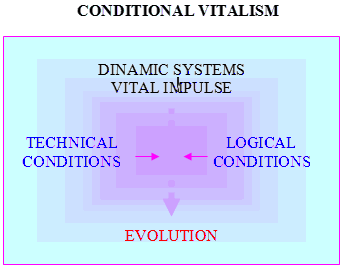3. The methodology of complex systems scientific research
The sixth method: Conditional Vitalism
Regardless of the consequences that the Conditional Evolution of Life (CEL) could have in the scientific and technical fields, this theory means a research methodology for complex systems.
The CEL is the result of applyingpure logic to the essential instrumental objectives of Life, and the concept of internal improvement of genetic information as the motor of evolution; in other words, the new theory of evolution is an extraordinary case of the methodology of vitalism research.
This sixth method –let us recall the three basic scientific methods of the argument of a theory and the two scientific methods for its validation– is different from the previous in that it is not a primary scientific method but rather a compound method consisting of various forms of the argument and empirical research.
Consequently, the sixth method of the Conditional Vitalism would belong to the theory of the complex systems conveying a distinctive methodology of science under its characteristics of scientific research.
The section related to the Vitalism of the CEL mentioned above theory discusses the characteristics of living beings and, by extension, the complex systems with vital impulse.
Once there is a complex system, the first stage of scientific research will be to study which factors or elements affect it or technical conditions.
These systems must have a purpose and intermediate objectives that scientific research should identify as a second stage, such as specific methods, processes, and instruments for its attainment.
The goals correspond to the logical conditions.
To the extent that a system meets the essential characteristics of living beings and the new method can identify an enough set of derived elements, the complex system will behave as if it had a genuine Life impulse.

The characteristics of the methodology of complex systems resemble a bit of Chaos theory as an attempt at structuring elements that, briefly, seem wholly inconsistent or independent of each other.
The characteristics of fractals and their mathematical representations also relate to the new methodology. A pretty example is the dynamic fractal of the flame of a bonfire.
Nevertheless, the topic is not so novel since it is the argument in which the modern economic theory upholds. The entire economic theory derives from the additions of individual preferences and alternative uses that come to collect the vital impulse from the individuals.
In other branches of knowledge, knowing the instrumental objectives of a complex system, the same methodology could give surprising results.
Let us think about which is the motor and the forces moving the economy, research in general, or that of the political system. In cases of elevated levels of complexity, the use of partial analysis models is advisable.
Even if the consequences of the Conditional Evolution of Life were far-reaching, we must be conscious that vital impulse systems have existed and have followed their internal dynamics even though we now may understand them better. Before Galileo, the Earth had also been revolving around the Sun!
